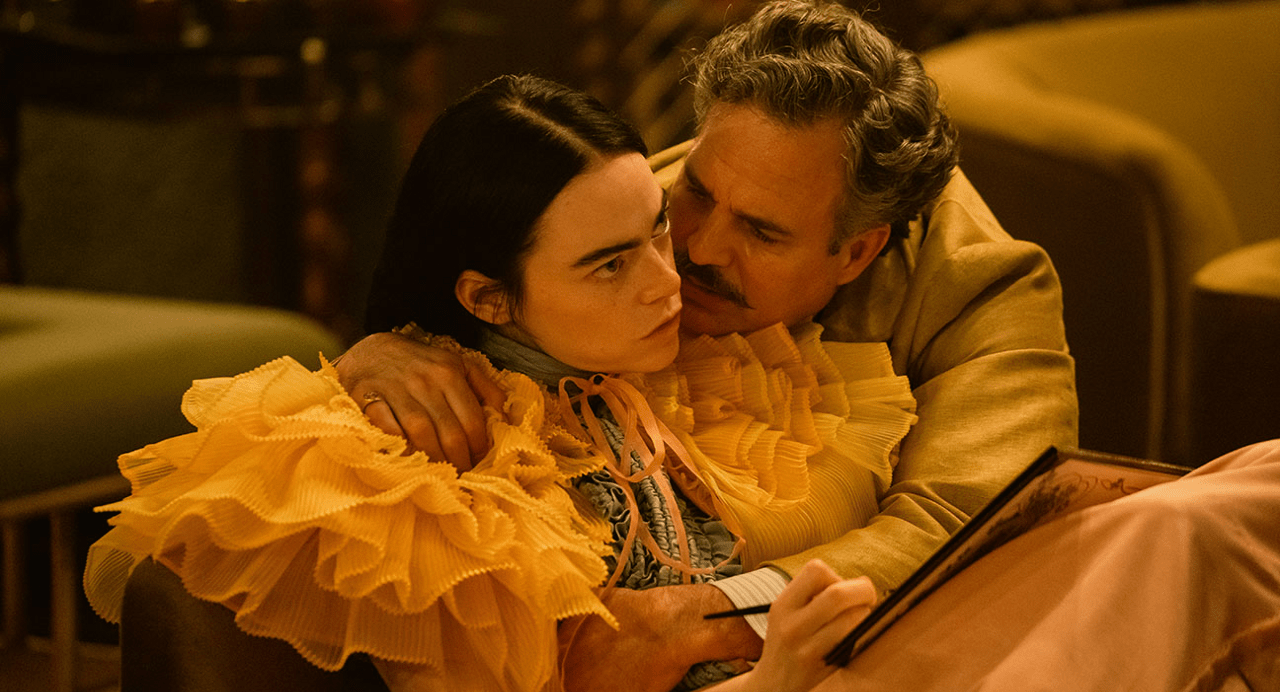Poor Things
Rating
![]()
Director
Yorgos Lanthimos
Screenplay
Tony McNamara
Length
2h 21m
Starring
Emma Stone, Mark Ruffalo, Willem Dafoe, Ramy Youssef, Christopher Abbott, Kathryn Hunter, Jerrod Carmichael, Hanna Schygulla, Margaret Qualley, Vicki Pepperdine
MPAA Rating
R
Original Preview
Review
Life is strange and then there’s Poor Things. Set in a steampunk world of Victorian custom, Bella Baxter (Emma Stone) learns to experience life in her own way even if it grates against societal norms.
For those unfamiliar with steampunk as a setting, take late 19th Century ideas, ideals, and science and extrapolate those into a speculative history. Jules Verne and H.G. Wells were particularly adept at these types of narratives; although for them, it was truly futuristic, a future that would never come to pass. Poor Things is set in one of those types of futures where ships sail through the sky in steam-powered apparatuses. Bella is part of this world where her scientist “father” (Willem Dafoe) wants nothing but her happiness yet fears that her underdeveloped brain will allow her to be taken advantage of. His research assistant (Ramy Youssef) intends to marry her but their lawyer (Mark Ruffalo) has other plans and whisks her away on an international voyage that will test his patience and allow her to fly.
Despite his more mainstream effort in The Favourite, director Yorgos Lanthimos has returned to the avant garde approach that made The Lobster so compelling. By creating quasi-futuristic environments to explore his subjects, he gives them a fantastical veneer that underlies the modernist thematic exploration he has become known for. In Poor Things he explores concepts of bodily autonomy and sexual liberation in a scientifically-dubious environment where solutions to problems that don’t exist can have lasting impact on the characters who experience them.
In her performance, Stone finds the innocence at the heart of her character, a mere child in the world around her. Yet, her father’s vast education of the young woman allows her to have a new perspective on life that those raised without the same forethought and reason would see as gauche or untoward. Ruffalo embodies the Victorian ideals of masculine ownership and entitlement, trying to impress upon young Bella his own strictures only to find that her rebellious spirit is stronger than his weakness can control. She eventually finds those sympathetic to her plight, including traveling companions played by compelling Jerrod Carmichael and resplendent Hanna Schygulla.
The performances in the film are blended wonderfully and while they are high-minded extrapolations of concepts and ideas, they still feel inherently human. The setting of the film is beautifully realized by production designers James Price and Shona Heath with an assist from skilled costumer Holly Waddington. The film is visually striking and audiences won’t leave without being fully engrossed in the events on screen. That the film takes on an almost professorial approach to its themes, lecturing the viewer on the proper viewpoint to carry away from the film, is its weakest element. Tony McNamara’s screenplay is literate to a fault and that disconnected approach to storytelling is felt strongest when Bella returns to London and her carefully constructed house of cards risks collapsing.
The photography by cinematographer Robbie Ryan feels inconsistent, the use of black-and-white, mostly at the beginning, and color, for the rest of Bella’s awakening. At first, it seems part of the mad scientist portion of the film, clearly inspired by the likes of Frankenstein and Metropolis. Yet, it persists well past the point where it would be needed. This plus the constant use of fish-eye lenses serves to distract the audience with fancy camera techniques that serve modest purpose and become excessive and frustrating after a while.
For those interested in seeing something unabashedly unique, Poor Things will provide that. Lanthimos’ aesthetic is peculiar yet inviting, a historically-rooted style reminiscent of his contemporary Wes Anderson. However, like Anderson, Lanthimos’ approach to filmmaking is something of an acquired taste and won’t appeal to everyone. Those who can get past the peculiar nature of the setting and the overbearing camerawork will be rewarded with something genuinely compelling.
Review Written
January 24, 2024



















Leave a Reply
You must be logged in to post a comment.